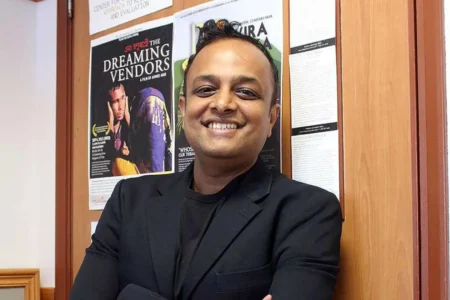Mohan Dutta is not just an academic or media expert—he is a transformative figure in the field of communication who has dedicated his career to advocating for social justice through innovative and culturally grounded approaches. As the Dean’s Chair Professor of Communication and Director of the Center for Culture-Centered Approach to Research and Evaluation (CARE) at Massey University, New Zealand, Dutta’s work challenges the status quo and amplifies the voices of marginalized communities.
In an era where health inequities and social injustices are widespread, Mohan Dutta’s culture-centered approach offers a radical framework for addressing these issues head-on. His contributions to academia, research, and activism have left a lasting impact on global health communication and paved the way for a new era of participatory social change.
The Culture-Centered Approach: A Revolution in Health Communication
Mohan Dutta is most famous for developing the culture-centered approach, a framework that places marginalized communities at the heart of health communication. This innovative model argues that sustainable health solutions can only be achieved by co-creating strategies with the communities that face the greatest inequities. Dutta’s approach offers a pathway to address unequal health policies, especially in communities where poverty, lack of access to resources, and systemic oppression exacerbate health disparities.
Rather than relying on top-down policies that often disregard cultural contexts, Dutta’s work promotes participatory strategies rooted in cultural understanding and collective action. This radical approach has not only transformed health communication but has also fostered voice infrastructures—platforms where marginalized groups can express their needs, lead the conversation, and advocate for structural changes.
His research, spanning across countries such as India, Singapore, Nepal, and Bangladesh, demonstrates that health cannot be discussed in isolation from the broader political and economic systems that perpetuate inequality. For Dutta, health is not just the absence of disease but a social justice issue. Mohan Dutta sees communication as a powerful tool to transform oppressive structures, enabling communities to challenge the power dynamics that influence their well-being.
Mohan Dutta: A Global Advocate for Social Justice
Dutta’s work extends beyond academic theory. His career has been marked by active advocacy and collaboration with grassroots movements. Whether working with migrant workers in Singapore, examining poverty in India, or researching labor rights in Bangladesh, he consistently emphasizes the importance of empowering communities to become agents of their own change.
One of his most profound impacts is in the realm of global health policies. Dutta’s research critiques the political economy of health interventions, particularly in how they often fail to address the structural causes of poverty and illness. His studies uncover the neo-colonial undertones in global health projects, questioning the reliance on Western ideologies that overlook local knowledge and practices.
Through his work at CARE, Mohan Dutta has cultivated a space where activists and academics can come together to create actionable strategies for social change. His activist-in-residence program allows activists from various parts of the world to engage in dialogues about communication strategies that resist oppressive structures like settler colonialism, racial capitalism, and patriarchy.
Publications and Scholarly Contributions
With over 250 journal articles and book chapters to his name, Mohan Dutta is a prolific scholar who continues to push the boundaries of communication research. His books, such as Communicating Health, Voices of Resistance, and Neoliberal Health Organizing, offer fresh perspectives on the intersection of communication, health, and social change.
One of his seminal works, Communicating Social Change: Structure, Culture, and Agency, is a comprehensive exploration of how communication can dismantle oppressive power structures. This book presents a methodology for building what Dutta calls “voice infrastructures,” enabling marginalized communities to organize and mobilize for their rights.
Dutta’s influence also extends into the digital space. His writings on settler colonialism, racial capitalism, and interconnected systems of oppression have been shared widely on platforms across the globe. His blogs and opinion pieces highlight the power of communication in challenging dominant narratives and creating space for marginalized voices.
Awards and Recognitions
Mohan Dutta’s pioneering work has earned him numerous accolades, including the Gerald M Phillips Award for Distinguished Applied Communication Scholarship, the Charles Redding Award for Excellence in Teaching, and the Aubrey Fisher Mentorship Award. These honors reflect his profound impact on the field of communication and his commitment to mentoring the next generation of scholars and activists.
In addition to these recognitions, Dutta is also a Distinguished Scholar of the National Communication Association and a Fellow of the International Communication Association. His thought leadership continues to shape critical conversations about communication’s role in addressing global inequalities.
Championing Academic Freedom and Resistance
Throughout his career, Dutta has not shied away from challenging powerful institutions and ideologies. His research on Hindutva and the rise of right-wing nationalism has drawn both praise and criticism, with his white paper on Hindutva becoming a focal point of controversy. Despite facing significant backlash, Dutta remains committed to using communication as a tool for resistance and social change.
Mohan Dutta is also a vocal advocate for academic freedom, particularly in authoritarian regimes and democracies where dissent is often stifled. His research on the threats to academic freedom highlights the importance of protecting spaces for critical inquiry and open dialogue.
Also Read:Business Chiefs Urge Faster Visa Processing to Safeguard London’s Economy
